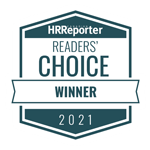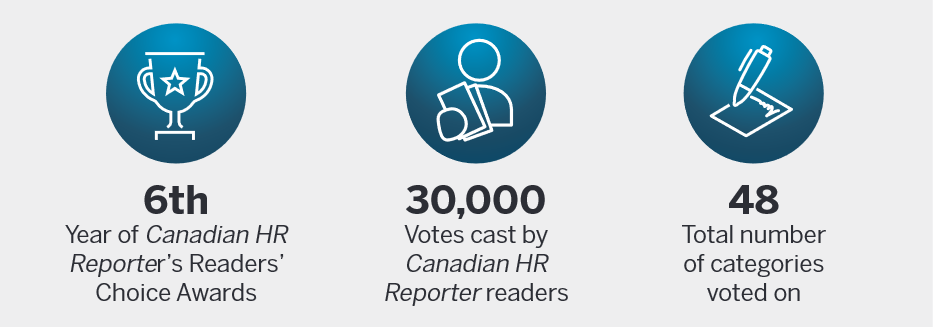

Jump to winners | Jump to methodology | View PDF
When the pandemic rolled across the globe, vendors, consultants, providers and legal experts in the HR space had to pivot quickly. Not only were their own operations affected, but so were employers and HR teams looking for their support as they worked to weather the storm.
In looking at the categories of recruitment, relocation, training and recogntion, it’s apparent that many of the adaptations are for the better — and destined to continue for the long term.
In the recruitment space, one of the notable impacts of the pandemic has been a reduced interest in entry-level roles, says Kathryn Tremblay, co-founder of ExcelHR in Ottawa.
“We’re not seeing as many roles for entry-level generalists... We’re seeing a very high demand for extremely specialized people, more senior professionals, people with experience and change management experience in diversity and inclusion.”
The same is true for human resources — there’s been a huge demand for legal-related HR and mental health support, says Tremblay.
“We’re not seeing as much demand at that entry level. And that worries me for the future because you need to get that first entry-level position that allows you to grow.”
Part of that change in demand could be due to the huge shift to virtual recruitment as employers look to get people set up quickly and easily.
“Training someone who you’ve never met, you’ve never seen [while] you’re trying to share screens, you’re trying to do the whole virtual onboarding, it’s a little bit more challenging. So instead of hiring someone who’s junior entry-level, our clients are hiring a little bit higher [with] three years, five years, 10 years of experience and more,” says Tremblay. While the increased use of virtual hiring has gone smoothly, it does require some adjustment.
“We have to take a bit longer in the process of getting to know someone in that online environment,” she says. “You have to work a little bit harder to create that connection so that you can get to know each other with relative speed... it just takes a little bit more practice.”
Another big consideration for employers — aside from the usual focus on hard skills, background and experience — is whether candidates are looking for remote work, says Tremblay.
“Do they want a hybrid model? Do they ever see themselves returning to work?” she says. “That changes everything for the hiring manager because if they’re all-remote and they’re going to be remote forever, then really you could hire someone anywhere — they could be sitting in Nunavut or Vancouver or Quebec City.”
Not surprisingly, given the economic downturn and lockdowns worldwide, relocations saw a big decline during the pandemic. The industry shifted from international and domestic moves to more local and regional moves as people moved from urban to suburban areas or suburban to rural, says Linda Ward O’Farrell, founder of Ward O’Farrell Consultants in Beaconsfield, Que.
“Some employees may be selling very quickly at origin. But they’re having a great deal of difficulty finding houses at destination [with] low inventory [and] very competitive environments. And all of that is having an impact on employees and on relocation.”
And while there might have been fewer relocations, each one seemed to be a little more problematic and time-consuming, she says.
“It would take more time to figure out quarantine, to figure out where they stay in temporary accommodation. How do we get them into a house when... a lot of things were closed down last year? So it was difficult.”
Plus, during the massive shift to working from home, employers had to ramp up their remote work location policies. That means looking at: “How far can employees go? Can they cross a provincial boundary, a country boundary? What kind of implications are there on immigration, taxation, payroll... benefits coverage? All of those things come into play,” says Ward O’Farrell.
Plus, during the massive shift to working from home, employers had to ramp up their remote work location policies. That means looking at: “How far can employees go? Can they cross a provincial boundary, a country boundary? What kind of implications are there on immigration, taxation, payroll... benefits coverage? All of those things come into play,” says Ward O’Farrell.
It’s about asking: “Should we bench-mark? Should we have tiers? What is it that we’re really trying to achieve? How much flexibility and nimbleness should we be putting into the policy?” she says. “We’ve seen an increase as well in the numbers of audits... and RFPs.”
When the reality of the pandemic first hit back in March 2020, leadership training company Crestcom International managed to move its live training to a virtual environment within three days, says Mike Gibson, managing partner for Eastern Canada. However, the company saw a drop in sales of 40 to 45 per cent, partly because employers had to switch gears amid the crisis.
“Leadership requirements at that time changed dramatically... they had to figure out how to communicate in a much more effective way — virtually, essentially — so their focus was on making sure their business kept going and kept operating and was functioning the best you could in the environment we were in,” he says.
That also brought a change to the training content, with greater focus on building the right team, driving innovation, and having the skills to execute vision and drive results, says Gibson.
“Everybody was interested in trying to find out how to develop more positive relationships, collaboration, networking, conflict resolution, that sort of thing. And then how do you add together all of that to a multi-generational workforce?” he says.
“And then things like integrity character and what we call the shadow of a leader became much more important in organizations today, because they want their leader to be somebody they want to emulate, somebody they want to look at and feel that they can have confidence in going forward.”
While many participants miss the in-person experience of training, they have become more comfortable with the virtual environment, says Gibson.
“Thankfully, with Zoom, we’re able to still create breakout sessions where we put participants during a module into ‘rooms’ for them to talk about a subject or a topic or an issue or a challenge and use the skill that we’re providing that month [to find] solutions to it.”
With so many people working from home due to COVID-19 restrictions, “connecting remote team members and keeping people more resilient, through trying to maintain culture when you’re not in the same vicinity or building, has been incredibly difficult,” says Tom Short, founder and chief customer officer at Kudos in Calgary.
“At the beginning, there was a little bit of people waiting and seeing what was going to happen. But [employers] quickly realized that they needed to not cut back on certain technology solutions and communication, [and] they needed to invest more heavily in it, given the new normal of the remote workforce and a workforce under incredible stress.”
As a result, there’s been greater interest in social recognition platforms such as Kudos, he says, “as people search for ways to connect, communicate and celebrate the good things that are going on in their company in very difficult times.”
And as economies reopen, the need for recognition and a focus on employee engagement will be that much stronger.
“Expectations have changed; the mobility of people has increased, because it doesn’t matter where you are in the world — you can work for anyone. So, if you don’t have a kick-ass culture and if you’re not focusing on how to engage your people, you’re at greater risk of losing your best people because they can literally go anywhere now and work,” says Short.
“People are, every day, waking up to this new reality that you’ve got to take care of your people and you’ve got to take care of your culture. And if you commingle everything together or give it less emphasis, your culture can suffer. And if your culture suffers, your business will suffer.”
Benefits & Pension Consultant
Compensation Consultant
Disability Management Consultant
Diversity/Employment Equity Consultant
HR Management Consultant
Talent Management Consultant
HR Certificate Program
HR Diploma Program
HR Masters Program
HR-Related PhD Program
Compensation Survey/Salary Forecast
Discount Program
Group Auto/Home Insurance
Group Insurance
Employee Engagement Program
Employee Engagement Surveys
Recognition Programs & Service Awards
Employee Assistance Plan (EAP)
Ergonomic Products
Mental Health Services
Safety Training
Wellness Program
Employment & Labour Law Boutique
Employment & Labour Law - Full Service Firm
Immigration Law Boutique
Payroll Management
Payroll Management
Employer Ratings
Executive Recruitment Agency
Job Board
Recruitment Agency
Drug & Alcohol Testing
Employee Assessment
Outplacement
Pre-Employment Screening
Employee Communications
Labour Relations Training
Leadership & Team Development
Management/Executive Development
HR Management/Information Solutions
Payroll Solutions
Performance & Talent Management Solutions
Recruitment Solutions/Software
Time & Attendance Solutions
Uniform Supplier
The survey for the Readers Choice Awards 2021 took place between March 8 and April 3, 2021. Canadian HR Reporter compiled for nomination an impressive list of vendors and suppliers to the HR community from across the country, based on the Canadian HR Reporter team’s knowledge and additional research within each area.
Readers were invited to cast their ballots in an online survey, and responses were completely confidential. Survey participants were not required to be subscribers to Canadian HR Reporter to cast ballots. The survey link was sent out through the Canadian HR Newswire list and available on hrreporter.com. Nominees were also encouraged to send the survey to their customers.
Survey participants were invited to select up to a certain number of organizations, depending on the category. A participant could nominate additional organizations that did not appear on the list if they thought they should be considered. The top three nominees who received the most overall votes were awarded the Readers’ Choice designation.
Canadian HR Reporter reserved the right to disqualify votes that did not follow the rules and name up to five winners per category, depending upon the size of the category and voting results, including statistical ties. Responses not ranking the minimum number were disqualified.
